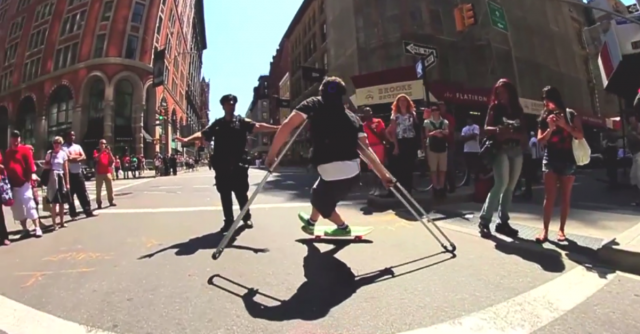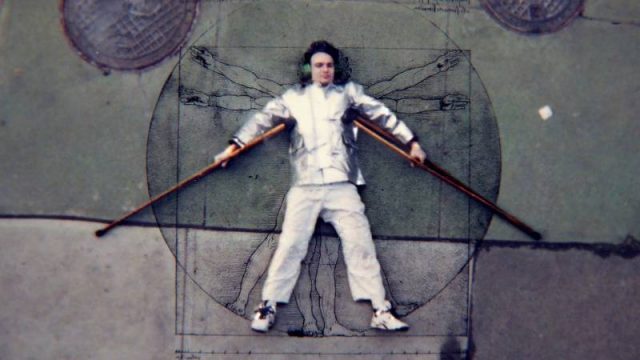
Bill Shannon moves and grooves through the 2012 New York City Dance Parade in Crutch (photo by Thos Robinson)
DOC NYC: CRUTCH (Sachi Cunningham & Vayabobo, 2020)
November 11-19, $12
www.docnyc.net
www.crutchdoc.com
“Everybody has crutches,” multidisciplinary artist and performer Bill Shannon says in Crutch, making its world premiere November 11-19 at the virtual DOC NYC festival. “Some of them you can see; some of them are invisible.”
The title is both literal and metaphorical. The Nashville-born, Pittsburgh-based Shannon has been called “Crutch” since he was a kid; he has required the use of crutches most of his life because of the degenerative bilateral hip deformity Legg-Calvé Perthes disease. A skate punk, Shannon designed a unique set of crutches with rounded bottoms and developed a career as a dancer, choreographer, and visual artist that combined the crutches with skateboards, public intervention, and neuroscience.
The film follows Shannon, who recently turned fifty, for twenty years; it is directed by Frontline veteran Sachi Cunningham (the two have known each other since grade school, and she once dated his brother) and capoeira documenter Vayabobo, aka Chandler Evans. Crutch incorporates footage from throughout Shannon’s life with new interviews with friends, colleagues, family, dance critics, and Shannon himself, who speaks his mind onstage and off as he travels from Pittsburgh to New York City, California, and Florida as well as England, Australia, Canada, Finland, Russia, and Spain. The film is structured around Shannon’s visit to Camp Perthes USA, where children with the disease can participate in sports and other activities while learning to embrace their disability.
In such exhibitions and live shows as “The Evolution of William Foster Shannon,” Touch Update, and Traffic: A Transient Specific Performance, the onetime Easter Seals poster child has developed not only a unique choreographic language but also his own terminology to describe what he does, including such phrases as “gestures of help,” “the weight of empathy,” “reflections of enquiry,” and “the ambiguity of disability” that drive his practice, which is anchored by interaction with the public. The film is available online through November 19 and is accompanied by a Q&A with Cunningham, Vayabobo, and Shannon. Shannon, who is sheltering in place with his family in Pittsburgh, took some time away from the opening of the film and a conference to discuss Camp Perthes, the art of provocation, the pandemic lockdown, and more.
twi-ny: There’s a lot of old footage of you in the film, including your childhood and teen years. What was it like going through your archives to find the material? Is it difficult to watch footage of yourself of the years when you did not need the crutches? As a viewer, those transitions are deeply affecting.
bill shannon: I have had the privilege and joy of a father who studied film photography in the ’70s and was very technical in his approach. Then my brother was a very talented artist all around and he took great photos in the mid-to-late ’80s, and also my good friend Brian’s photos and videos from the mid-’80s into the ’90s had a big presence as well. Digging it all out, scanning it all was a long, drawn-out process because I never throw anything away.
twi-ny: At one point in the film you talk about how your work involves looking at people looking at you. Have you seen the final cut of the film? What do you think of it in that context, now that another level has been added to that relationship?
bs: I have seen it. It’s very meta, yet also there are not enough details within the doc to really sink into the meat of the public street work in terms of language and phenomenology. The doc does get the message out in a clear way, though.
twi-ny: The scenes of you at the camp are very emotional, both to you and the audience; the look on the kids’ faces as you talk to them and dance are just beautiful. What was that experience like for you, especially since there was nothing like it when you were their age and dealing with the disease?
bs: The experience was very moving. My kids got to meet other kids with Perthes and have more info on what I went through. This was also a case of the film documenting its own impact on my life. The camp for kids with Perthes was through connections that Sachi and Chandler made in the process of looking for others with Perthes to interview. They then organized the visit and flew me out there with my kids. I wish I had had something like the camp at the time I was a kid; I think it would have shifted my worldview and sense of belonging.
twi-ny: You’ve performed all over the globe. Are people’s reactions, particularly when you descend stairs or fall to the ground in a public place, the same everywhere when it comes to their opting whether to become good Samaritans? Have their reactions changed over time, regardless of where they are? I remember that in a promo piece for “Touch Update,” you specifically ask the question “Can people change?”
bs: There are regional variables. There are variables in what “falling to the ground” actually looks and feels like. Reactions are very diverse and also context dependent. I do believe that people change. The international diversity, say, between Mexico City and Novgorod, Russia, or Cairo, Egypt, are vast and fascinating.
twi-ny: How has Pittsburgh been dealing with the pandemic?
bs: Pittsburgh, like most places, has its share of individuals who are pretending it’s not real. Pittsburgh allowed for kids to go back to school, which in my opinion is a very stupid move. It sucks for the kids during a time in their lives when social interaction and bonding with friends is everything. Youth are further pushed into the screens, and it’s really sad.

Bill Shannon’s life and art evolve in Crutch documentary
twi-ny: If you’re not going out much, do you miss the interaction you usually have with the public? The film focuses on how much you crave making those connections.
bs: I am feeling extremely out of sorts lately for a variety of reasons. Having some contact with the streets, with the world would mean so much to me. Working this week as part of a conference, I am reminded how much I rely on my physical presence and in-person communication to build trust and understanding with others. When it’s Zoom and text, I lose a lot of my tools.
twi-ny: One of the people in the film calls you an “agent provocateur.” Would you agree with that assessment?
bs: My mom called me a provocateur. It is true but not the “agent” part. That’s what cops do when they join BLM demonstrations; they become agent provocateurs and burn shit down and vandalize to give protesters and the cause a bad name. I wouldn’t want to be associated with the agent part, but being a provocateur, someone who provokes, is accurate.
twi-ny: Your art has progressed from skateboards and crutches to multimedia, multidisciplinary shows involving cutting-edge technology and neuroscience. What’s next for you?
bs: I really don’t think so much about what is next. Next will happen to me. I am here today in the moment and trying to solve problems that I have identified out of solutions I came across yesterday.